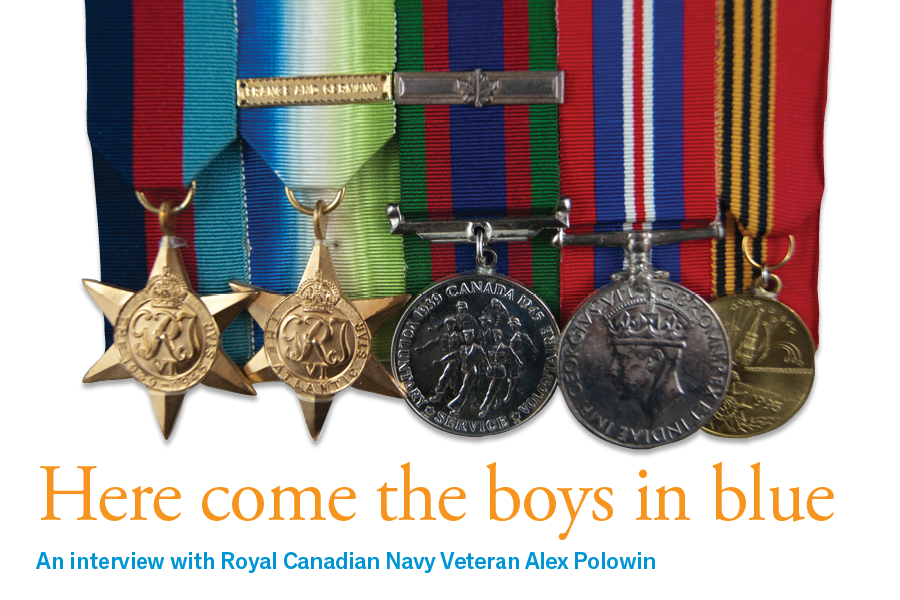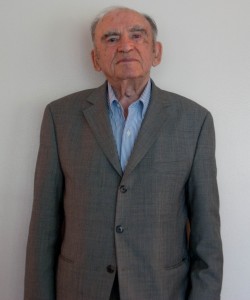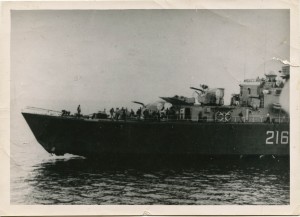
 It can be a challenge to make the realities of our past relatable to today’s students especially for battles fought far back like the Battle of Vimy Ridge during WWI. At Explorica, we bridge the gap by connecting students to the people and places where history unfolded, changing that relationship from distant stories in a textbook to visceral experiences. In that spirit, we introduce Royal Canadian Navy Veteran Alex Polowin. When he learned about our tours that visit many of the places he served, he was eager to share his experiences. Polowin and his family fled political unrest in their native Lithuania, settling in Ottawa in 1928. He enlisted in the Royal Canadian Navy at just 17 years old, and went on to serve in the Normandy Landings and other legendary missions. He was awarded several medals, including the French Legion of Honour to Non Citizens.
It can be a challenge to make the realities of our past relatable to today’s students especially for battles fought far back like the Battle of Vimy Ridge during WWI. At Explorica, we bridge the gap by connecting students to the people and places where history unfolded, changing that relationship from distant stories in a textbook to visceral experiences. In that spirit, we introduce Royal Canadian Navy Veteran Alex Polowin. When he learned about our tours that visit many of the places he served, he was eager to share his experiences. Polowin and his family fled political unrest in their native Lithuania, settling in Ottawa in 1928. He enlisted in the Royal Canadian Navy at just 17 years old, and went on to serve in the Normandy Landings and other legendary missions. He was awarded several medals, including the French Legion of Honour to Non Citizens.
Image Source: The Memory Project
Why did you decide to join?
I was motivated by my mother. We had family in Lithuania and conditions were terrible there. She often cried when she heard news reports about the Nazis. So, I convinced my father to sign a letter saying I could enlist. He didn’t read it carefully, and was upset when he found out I had joined. I picked the Navy after speaking with crew members; I liked the brotherly camaraderie.
Do you recall your first days in training?
I was lonely. Unlike the other crewmen, I had a curfew because of my age so I didn’t get to go out much. I focused on other things like the boxing team. I was even the lead role in a play. During training, we learned parade square exercises, drills and how to tie knots like the Boy Scouts. It was a very intense regimen so I used moderation and balance to fight fatigue. I didn’t want to mentally or physically exert myself more than I had to so I could complete training and fight.
Do you remember your first days of convoy duty?
It was during the winter and our base was in Northern Ireland. The crew on the HMCS Huron was very young; they told us we were picked because of our medical records, which stated we were mentally and physically capable for the endeavour. You really had to be mentally tough—some of the crewmen collapsed when the firing started, they just collapsed out of fear.
What duties did you have?
When we left from St. John’s, Newfoundland, I was a helmsman and my duties included cleaning, mopping, and maintaining the warships. During convoy duty, our mission was to escort merchant ships between Scotland and Murmansk, Russia.
Did you feel pressure or stress? I didn’t have excessive stress because I adapted well to combat life. I was frightened, but it eventually became part of my daily routine and the repetition helped. During our off duty time we’d entertain ourselves by storytelling or playing cribbage or checkers. Playing the harmonica was one of my favorite ways to unwind and deal with the pressure.
What was combat like at sea?
We carried torpedoes on HMCS Huron and attacks happened often. Every other night we had combat missions; on December 26, 1943 we carried out depth charges, which are anti-submarine weapons.
In 1944, we travelled to the English Channel to face off with Nazi warships and we knew that the enemy was going down because they were outnumbered. But it wasn’t that easy. When we approached the German-held French coast, we lost the HMCS Athabasca. Our ship was also damaged and we were forced back to port. Seven months later we returned to battle. The danger made our redeployment tense and exciting.
What duties did you have during the D-Day attacks?
I was part of the gun crew in charge of operating and maintaining the 4.7 inch naval guns. We were all young, but we had a good skipper leading us so we got used to handling the weapons quickly. We hunted the enemy on D-Day; three days later we found what we were looking for. There were 10 of us against five of them and they were already out of commission. We did our job and banged them up so they couldn’t return to port. I don’t think I would have joined if I had known what I was getting into.
Do you recall the last days of your service? It was autumn of 1945 and I felt a kind of emptiness. I didn’t want to fight a war anymore but at the same time I didn’t want to lose the incredible bond of friendship I had with my crewmen. Over time, people move on with their lives, they change and it’s hard to stay connected.
Looking back now, what are your thoughts on war and your military experience?
I never liked war; I don’t like it now and I didn’t like it then. It was my duty and my temperament to serve my country and protect my family. The sacrifices my generation made were honourable and we were treated with respect because of it. Looking back on it now, my generation did a lot to change Canada. Once the war ended and time went on, I stopped thinking about it little by little.
What would you tell the next generation?
When my father was in Lithuania he was unskilled. He came to Canada and had the opportunity to become something great and he took it. I want to sell Canada to the youth. I ask that the next generations take time to appreciate Canada, to get to know their country, to love their country and stand united.
We thank Alex Polowin for taking the time to share his amazing story.

